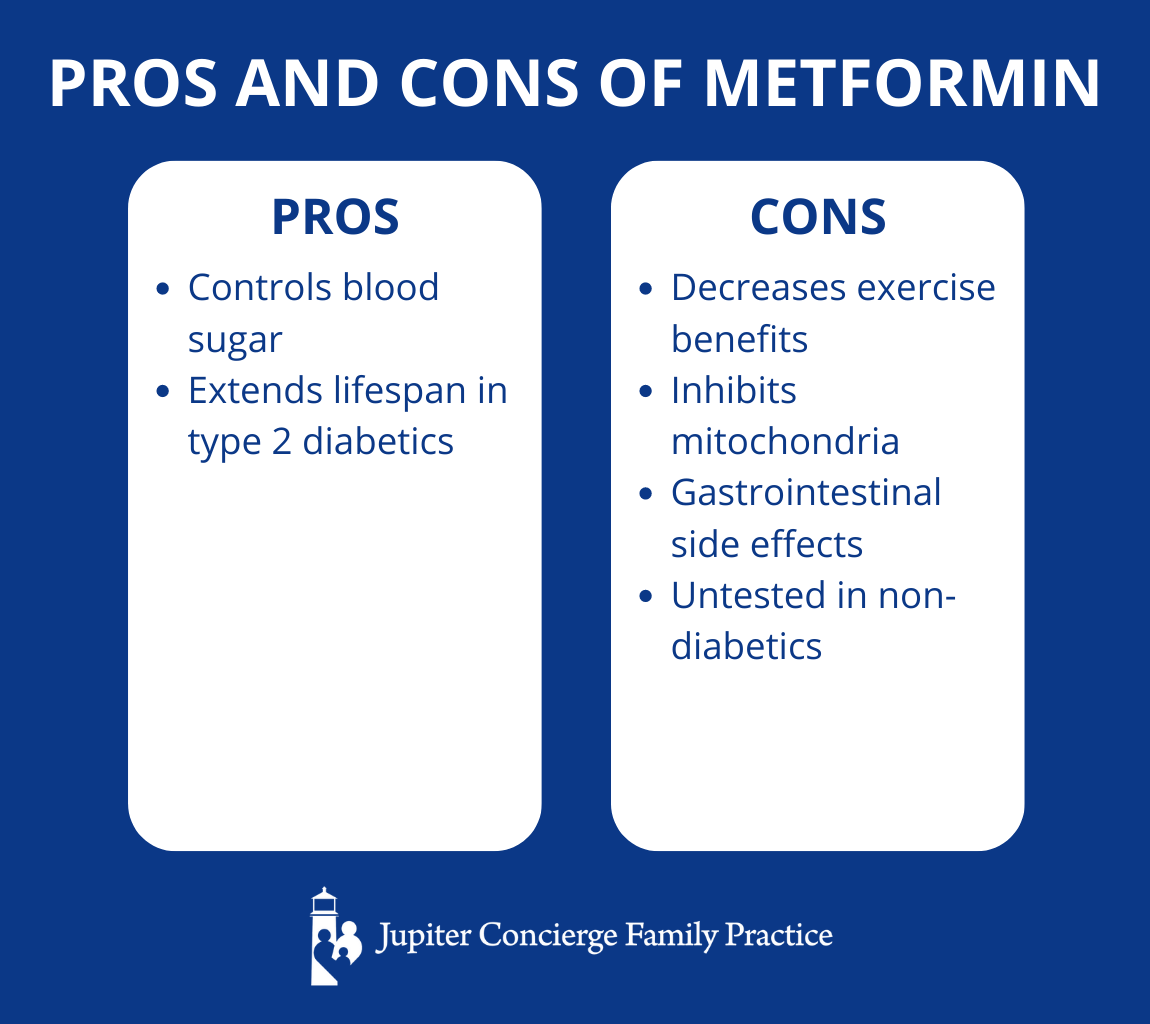
Every so often, certain pharmaceutical drugs gain applications outside of their original intended use. New research and patients’ real-world experience sometimes reveal unforeseen ways medications might benefit people and lead to new, “off-label” uses.
Metformin, a diabetes drug, is one such case. In recent years it has attracted both acclaim and doubt as an anti-aging drug. Here we’ll examine the claim, taking a look at the pros and cons of metformin.
Metformin, An Overview
Metformin has a long history related to the treatment of type 2 (or adult onset) diabetes. Used to help control blood sugar, metformin is considered a first-line treatment for high blood sugar associated with diabetes.
How does it work? Metformin slows the breakdown of glycogen into glucose — a physiological process that takes place in the liver at night — and it does so effectively. The drug reliably lowers blood sugar by about 30–45 points, or drops A1C by 1–1.5.
Today, though, metformin has also become one of the most popular anti-aging drugs.
Metformin, an Anti-Aging Wonder Drug?
The Pros of Metformin
A quick Google search will show you that metformin has made a splash in the longevity market. Let’s talk about why.
In general, type 2 diabetics tend to live shorter lives than their non-diabetic peers. Metformin seeks to remedy that, lengthening type 2 diabetics’ lifespans so that they live longer than they would without the medication.
However, research also shows that diabetics who take metformin actually live longer than non-diabetics who don’t take metformin. As you might imagine, this has caused a surge in metformin’s popularity and conferred a reputation for improving longevity.
While that sounds like a pretty big pro, the evidence isn’t fully rounded out. It certainly provides an interesting avenue to investigate, but we don’t have enough evidence to reasonably draw the conclusion that metformin increases lifespan in non-diabetics. For example, there aren’t (yet) any studies that look at metformin’s anti-aging benefits in healthy individuals.
The Cons of Metformin
At Jupiter Concierge Family Practice, we don’t recommend that non-diabetic patients take metformin for anti-aging purposes. If you’ve read my posts before, you’ve likely heard me say this: There is no magic bullet. No single, perfect pill will solve all our medical problems.
We have to weigh the pros of any medical intervention against the cons, and metformin can have some cons.
We all know exercise is a crucial aspect of good health. Its benefits are many, profound, and far-reaching. Metformin can actually decrease the benefits of exercise.
Metformin works as a strong mitochondrial inhibitor, and can even shorten the lifespan of mitochondria. Overtaxed mitochondria lose some of the benefit they gained from exercise.
Metformin can also stress the gastrointestinal system, causing symptoms like nausea and vomiting, diarrhea, upset stomach, and abdominal pain.
Prescribing metformin as an anti-aging strategy goes against my philosophy of do no harm. In diabetes treatment, the pros of metformin seem to outweigh the cons. But as a theoretical longevity aid? Why incorporate something with unproven benefits and known detriments when there are better ways of dealing with aging?
Healthy, Effective Anti-Aging Strategies
Aging is a normal process of life. Although it may lead to disease, aging is not a disease in and of itself. All medically sound recommendations for managing and slowing aging typically address one or more of the four pitfalls of health: inflammation, insulin resistance, oxidative stress, and catabolism. They just do so in different ways.
Once again, we return to the simple principles. The quick fixes, miracle drugs, and anti-aging fads all come with downsides. It’s much healthier — and more effective — to manage aging and its pitfalls through lifestyle than through pharmaceuticals.
Let’s walk through each pitfall to identify straightforward, potent approaches to longevity:
Combat inflammation. Reducing inflammation through diet is a hard-hitting anti-aging strategy. Eat anti-inflammatory foods, and avoid processed (inflammatory) foods. Consulting a nutritionist can help you make informed choices about eating.
Avoid insulin resistance. Minimize intake of simple carbohydrates, practice intermittent fasting, and get plenty of exercise.
Minimize catabolism. As you age, it’s important to avoid the breakdown of important body tissues, such as muscle and bone mass. To reduce the effects of aging without injuring yourself, get exercise that’s appropriate for your age and physical condition. Healthy eating, as outlined above, also helps minimize catabolism.
Lower oxidative stress. Nutrition and stress elimination contribute to the reduction of oxidative stress. Seek out foods rich in antioxidants, which largely means colorful fruits and vegetables. Though food sources are best, you can consider supplemental antioxidants such as resveratrol when appropriate.

Pros and Cons of Metformin: Final Thoughts
While metformin is useful and effective at treating type 2 diabetes, its elective use in non-diabetic people to combat aging is questionable at best, harmful at worst. There is no known fountain of youth. The best way to manage aging continues to be to use your SENSE: sleep, exercise, nutrition, and stress elimination.

Dr. David Rosenberg
Dr. Rosenberg is a board-certified Family Physician. He received his medical degree from the University of Miami in 1988 and completed his residency in Family Medicine at The Washington Hospital in Washington, Pennsylvania in 1991. After practicing Emergency Medicine at Palm Beach Gardens Medical Center for two years, he started private practice in Jupiter, in 1993. He is an avid baseball fan and Beatles fanatic, since he was 8 years old. He has been married to his wife, Mary, since 1985 and has three grown children.
David completed additional studies at Mercer University, Macon, Georgia and obtained a BS in Chemistry in 1983.
“My interests include tennis, snow skiing, Pilates and self-development.”


